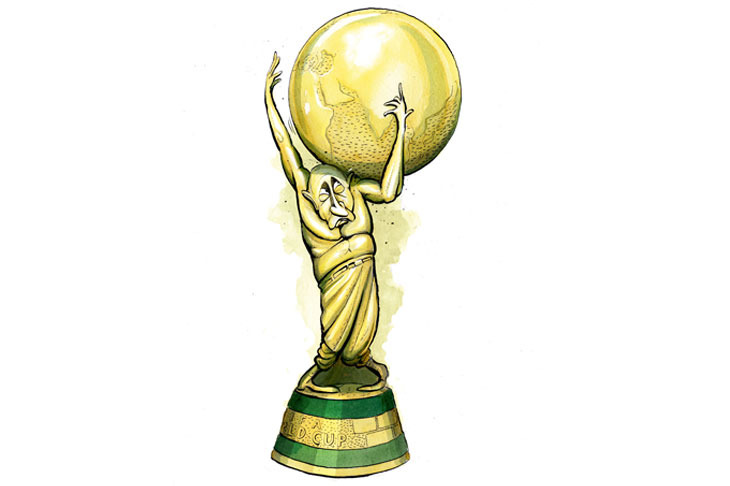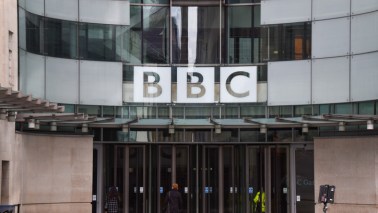This is Putin’s time. Next week, the Fifa World Cup kicks off in Moscow, and the Kremlin has spared no expense to showcase Vladimir Putin’s new Russia as a vibrant, safe and strong nation. Half a million visitors will be welcomed — with the Russian press reporting that the notorious ‘Ultra’ hooligans have been officially warned to behave themselves or face the full wrath of the state. Despite four years of rock-bottom oil prices, Putin has nonetheless found the cash to build or refurbish a dozen new stadiums. Moscow has undergone a two-year city-wide facelift that has left it looking cleaner, fresher and more prosperous than any European capital I have seen. The political message is clear: international opprobrium over the Skripal case, the destruction of Aleppo and the annexation of Crimea mean nothing to Putin. He has made Russia great again.
You can see why most Russians, and plenty of Putin’s admirers in the West, believe it. The oil boom that coincided with Putin’s rule has brought unprecedented prosperity to his countrymen. Putin’s replacement of bandits by state-approved extortionists in uniform and his ruthless crackdown on opposition voices in Russia’s once-vigorous media and parliament have created a silence that sounds to many like stability.
But under the patriotic hype over grand multi-billion dollar infrastructure projects like a new bridge to Crimea and shiny stadiums, Russia is crumbling. According to the country’s own statistics agency, there were 68,100 schools in 2000; 41,100 now. When Putin came to power, there were 10,700 hospitals but now there are 5,400. The amount of living space declared unfit for habitation has more than doubled — keeping pace with the numbers of bureaucrats, which has swollen from fewer than 1.2 million at the start of the millennium to 2.2 million today. Despite years of high oil prices, Russia’s GDP remains in real terms smaller than it was in 1990. China’s economy, over the same period, has more than quadrupled; America’s has nearly doubled.
To most Russian TV viewers, Putin’s invasions of Georgia and Ukraine, its military intervention in Syria and a splurge of military spending bringing it to more than 4 per cent of GDP are signs of Russia’s new-found strength. In truth, Putin’s foreign adventures have left Moscow less influential in Russia’s near-abroad than under Boris Yeltsin. Putin may have gained Crimea — but by annexing its pro-Russian population and removing it from Ukraine he ensured that there will never be a pro-Moscow government in Kiev, once Moscow’s most important natural ally.
The dictatorships of Central Asia have been thoroughly colonised by Chinese money and now sell most of their oil and gas to Beijing. China also dominates Eurasia’s only serious security bloc, the Shanghai Cooperation organisation. In energy, too, Russia is running on borrowed time. There hasn’t been a major oil discovery on the Russian mainland since 1973 — and to exploit offshore deposits in Sakhalin and the Arctic Shtokman shelf Moscow needs Western investment and know-how that is unlikely to be forthcoming after a series of blatant expropriations of foreign oil companies, including Shell and BP. Even to maintain production at current levels requires major investment — which has been decisively cut off by recent sanctions.
Putin, like Leonid Brezhnev before him, has been cushioned from the effects of the fundamental dysfunction of Russia’s economy by high oil prices. During the recent four-year dip — when prices crashed from $110 a barrel to just $30 — Putin maintained his popularity by inventing external enemies and involving himself in wars in Ukraine and Syria. With oil prices soaring, the cash tide has risen once more to obscure the barren economic midden that lies beneath. But make no mistake — Russia’s economy is stagnating, just as it did under Brezhnev, in a quagmire of official theft, capital flight and a brain drain of young professionals and entrepreneurs.
What has saved Putin is the devil’s own luck. Years of sanctions and rock-bottom oil prices since 2014 looked set to finally take their toll on Russia’s economy and threatened to turn Putin’s fourth term into a season of discontent. But in May, Donald Trump announced that the US would scrap Barack Obama’s Iran nuclear deal and re-impose sanctions on Teheran. At the same time, Washington launched sanctions against the oil industry of Venezuela over allegations of vote rigging by that country’s leftist President, Nicolás Maduro. The result has been an oil supply squeeze that has sent crude prices surging over $80 dollars a barrel. Trump may have believed that scrapping the Iran deal would punish America’s enemies — but in practice it has given Putin a new lease of political life.
For Putin, the windfall could not be better timed. In January, Russia’s Finance Ministry announced that the country’s $141 billion stabilisation fund, wisely created during the days of $150-a-barrel oil, had run dry. The Kremlin was planning pension reforms and painful budget cuts in order to balance the budget. Thanks to Trump, those plans have been shelved.
Europe seems to be going Putin’s way, too. Since at least 2011, Russia has been supporting and encouraging any movement or politician attempting to fracture European unity, from offering soft loans to Marine Le Pen’s Front National to cheap gas to Hungary’s Viktor Orban. In exchange, the would-be disruptors of the European project, from Britain’s Nigel Farage to Beppe Grillo, founder of Italy’s Five Star Movement, have responded with admiration for Putin. The new populist Italian government has already demanded an end to sanctions on Russia.
Putin’s hopes that Europe would begin to devour itself certainly appear to be coming to pass. Five Star is now the dominant partner in Italy’s coalition government — along with the equally Eurosceptic and Putin-admiring League. Orban, despite repeatedly defying Brussels over immigration quotas and crackdowns on free speech and academic freedom, was triumphantly re-elected in April with a two-thirds majority of Hungary’s parliament. And though there’s no serious evidence that Russian money, hackers or the propaganda efforts of the Kremlin–funded RT channel have played a decisive role in any of these political outcomes, the upshot remains that a divided, crisis-riven Europe is good news for Russia.
True, the Skripal scandal has been a setback — but only a symbolic one. Theresa May was able to mobilise an impressive number of world leaders to expel more than 120 Russian diplomats (even Orban threw one out). But Russia kicked out more — 189 — in retaliation, the Kremlin’s propaganda machine spun the scandal into a domestic political victory for Putin, and the economic cost to Russia was zero.
Syria has been much more important for Putin’s reputation. The Russian operation, launched in September 2015, was always more about asserting Moscow’s diplomatic clout on the international stage than about saving Assad’s regime. With the deployment of just a single squadron of 35 aircraft to Hmeimim airbase near Latakia, Putin was able not just to turn the tide of the war decisively in Assad’s favour but to claim that Russia had returned as a serious power broker in the Middle East. Moreover, Moscow has decisively taken control of the Syrian peace process, muscling out the US.
Trump’s demolishing of the nuclear deal has delivered Moscow a major diplomatic bonanza. The remaining signatories to the agreement — Britain, France, Germany and China — are now scrambling to find ways to keep the spirit of the pact alive in defiance of the US. Their goal is to present alternative incentives to prevent Iran from returning to uranium enrichment. But to do that they need Russian support. ‘For the first time, Europe, Russia, China and Iran are united,’ one senior Iran Revolutionary Guards general told an audience of international statesmen in London this week. ‘They all have one goal — to work to undo American madness.’
So far, multiple waves of European and US sanctions against Russia haven’t struck at the core of its economy. Some individuals close to Putin have had their travel and assets frozen, and most major Russian state-owned companies cannot raise finance on international markets. That’s a serious long-term problem for Russian development. But in the short term, Putin has been able to shrug off the worst inflationary effects of sanctions — for instance by imposing his own ban on the import of foodstuffs from Europe, which has sheltered Russian consumers from the 45 per cent collapse in the value of the ruble since 2014.
But if the political will existed, Brussels and Washington could devastate Russia’s economy overnight — just as they once did to Iran’s. Shutting Russia off from the Brussels–based Swift international bank–clearing system would ruin the Russian retail banking sector. Europe is too dependent on Russian energy exporters like Rosneft and Gazprom to suddenly refuse to buy Siberian gas — but technical restrictions on sales of Russian state equities on London’s stock exchange could send their share price crashing, just as recent sanctions against aluminium oligarch Oleg Deripaska wiped 40 per cent off the price of Rusal. Even without jeopardising its sales of cars, planes, consumer electronics or heavy machinery, Europe could inflict far more serious economic pain on Russia — if the political unity were there to do so.
But it’s not. That’s why European discord and Trumpian irresponsibility are so crucial to Putin’s political survival. But does that mean that Putin’s fourth term in power — or his fourth tsardom, as Russian liberals call it — will be a time of triumph rather than one of troubles? There are serious reasons to doubt it.
Above all, though many liberals in Europe and especially America portray Putin as a kind of global puppet master whose hacking and propaganda machinations have created a global triumph of populism, the truth is that Russia has been a beneficiary rather than a cause of the West’s populist convulsion. Like the druid who claims to have conjured a solar eclipse, Putin has been lucky with his timing rather than effective in his efforts. Unlike communism, Putinism has no claims to being a universal ideology. The Kremlin’s political technologists have created a grand-sounding medley of slogans which touch on national pride and conservative religious values, all sacrilegiously validated by invoking the USSR’s defeat of fascism in the second world war. But the reality is that Russia is an advanced kleptocracy ruled by profoundly cynical and corrupt men whose economy has been standing still for three decades.
Putin has bluster, confidence — and, once more, some oil cash to fund flashy international showpieces like the World Cup. But what he presents as a formula for national greatness is really founded on windfalls and luck, not judgment. And luck runs out.







Comments